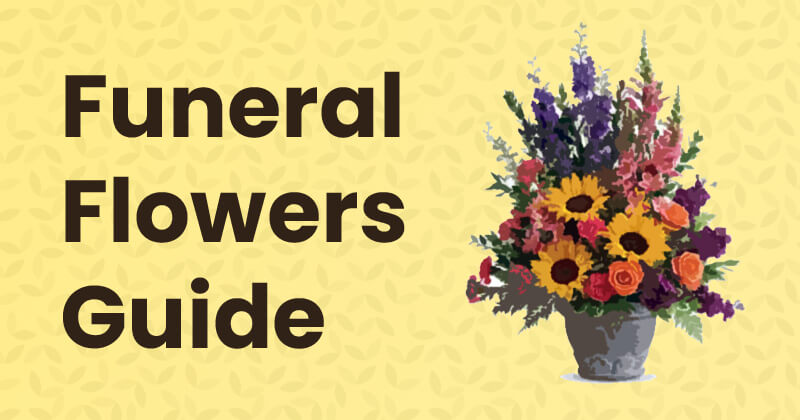When someone you know passes away, words can often be not enough. It is common to want to express your condolences with a symbolic gift like sympathy, consolation, or funeral flowers.
However, with so many types and arrangements of flowers available, it can be hard to know where to start. And that’s before you’ve even considered how, where, when, and to who they should be given!
I asked a handful of florists from states across the USA, “which flowers should I buy for a funeral?” The consensus was clear:
Typically, light-colored options like white lilies and orchids, pink roses, and yellow mums are the best flowers for funerals. They are all safe options, traditional and elegant, while symbolizing sympathy, condolences, purity, and peace.
Still, not everyone wants to choose the “safe option” but the meaningful option.
And your relationship with the deceased can affect the appropriate flowers for you. The best flowers for a person to bring for their parent’s funeral will differ from those they should get for a friend’s funeral.
In this complete guide to funeral flowers, I will set out everything you need to know to ensure you choose the best option for you.
In This Article
Best Flowers for a Funeral (Popular Types & Their Meanings)
| Symbolism | Popular Funeral Flower |
|---|---|
| Purity, peace, and innocence | White Lilies |
| Sympathy for the deceased’s family | Peace Lilies |
| Eternal life | Oriental Lilies |
| Gratitude and care for the deceased | Pink Roses |
| Deep love and respect | Red Roses |
| Passion and admiration | Red Carnations |
| A mother’s love | Pink Carnations |
| Faith, hope, sorrow, grief, and friendship | Purple Irises |
| Faithfulness, loyalty, and integrity | Gladioli |
| Elegance and innocence | White Orchids |
| Friendship and platonic love | Yellow Orchids |
| Mourning, grief, life, and rebirth | Chrysanthemums |
| Delicacy, love, and sympathy | Pink Tulips |
Whether you intend for these flowers to be displayed at the funeral or wake, or you want to send them to the deceased’s family, here’s where to start:
1. Lilies

White lilies are by far the most common funeral flower.
Whether held at a viewing or gifted as part of the sympathy arrangement, they are almost impossible to go wrong with.
White lilies symbolize purity, peace, and innocence. At Christian funerals, they are often framed as being symbolic of the deceased’s soul returning to its original state.
If you would like to go with a less traditional lily, you can also consider Oriental or Peace Lilies.
Peace Lilies are often gifted as a symbol of sympathy for the deceased’s family, while Oriental Lilies represent eternal life.
2. Roses
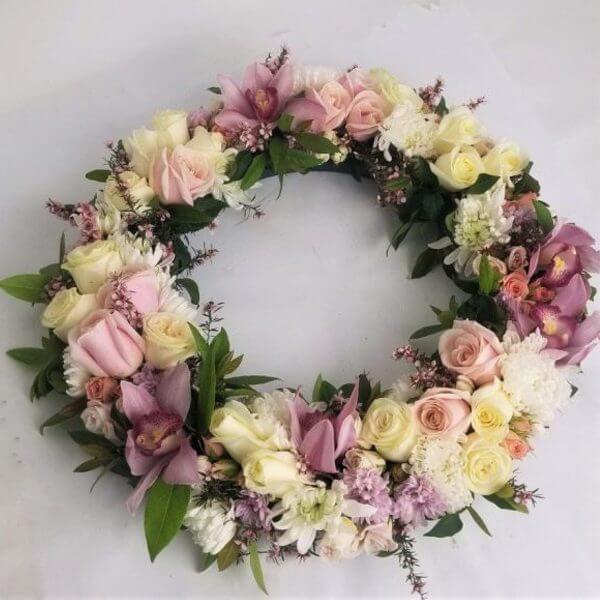
Roses are another popular pick for funerals. They come in a wide range of colors, each having its own specific meaning:
- Red roses symbolize deep love and respect for the person who has passed away and their family.
- Yellow roses symbolize friendship and companionship.
- White roses symbolize innocence, reverence, and purity, especially in the young.
- Pink roses symbolize gratitude and care for the deceased and pay regard to their grace.
- Crimson roses symbolize sadness.
If you are not a family member of the deceased, a wreath that includes yellow and pink roses is a good option. This arrangement expresses friendship and care for the deceased.
3. Carnations
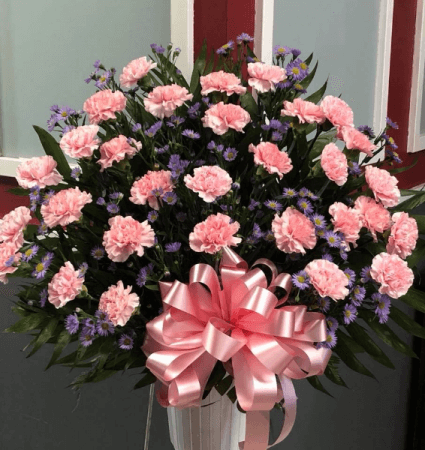
Carnations are one of those classic, traditional sympathy flowers. They often appear in funeral baskets or wreaths, like in the funeral basket shown above. Carnations are available in a wide variety of colors, the most popular of which are white, red, and pink.
Like most white flowers on this list, white carnations symbolize purity, love, and innocence. Red carnations represent passion and admiration.
Pink carnations are one of the most popular flowers for the funeral of a mother, as they symbolize:
- A mum’s love,
- The love and admiration you had for her, and
- Remembrance of her soul.
4. Irises
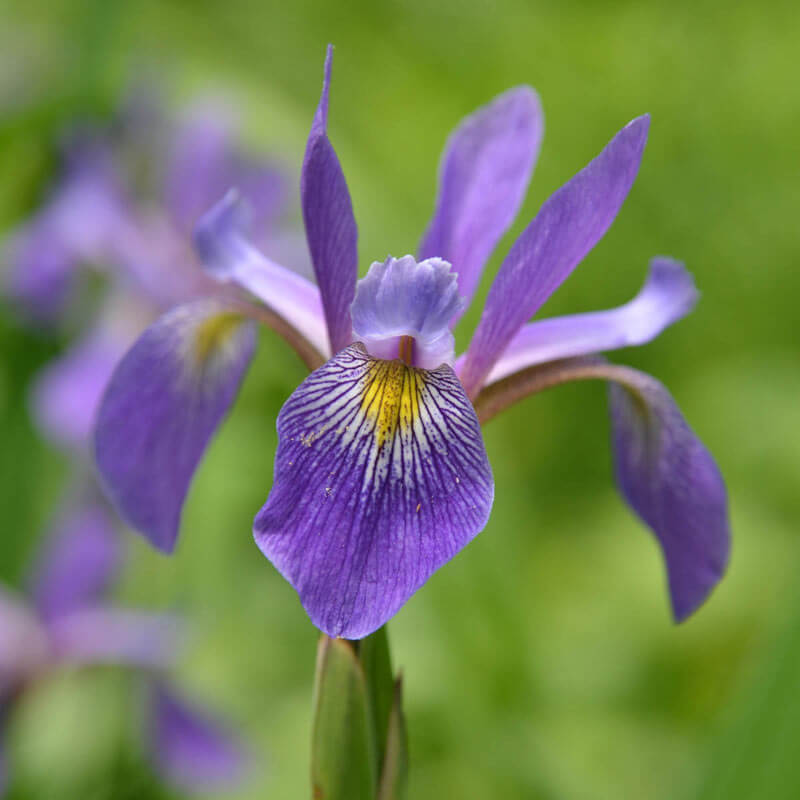
Irises are less common as sympathy flowers than roses and lilies. But it is still common to see them included in funeral arrangements.
Purple irises have various potential meanings, allowing room for interpretation. They can symbolize faith, hope, sorrow, grief, and friendship.
They are beautiful, delicate flowers that will always have a place at a funeral if desired.
5. Gladioli
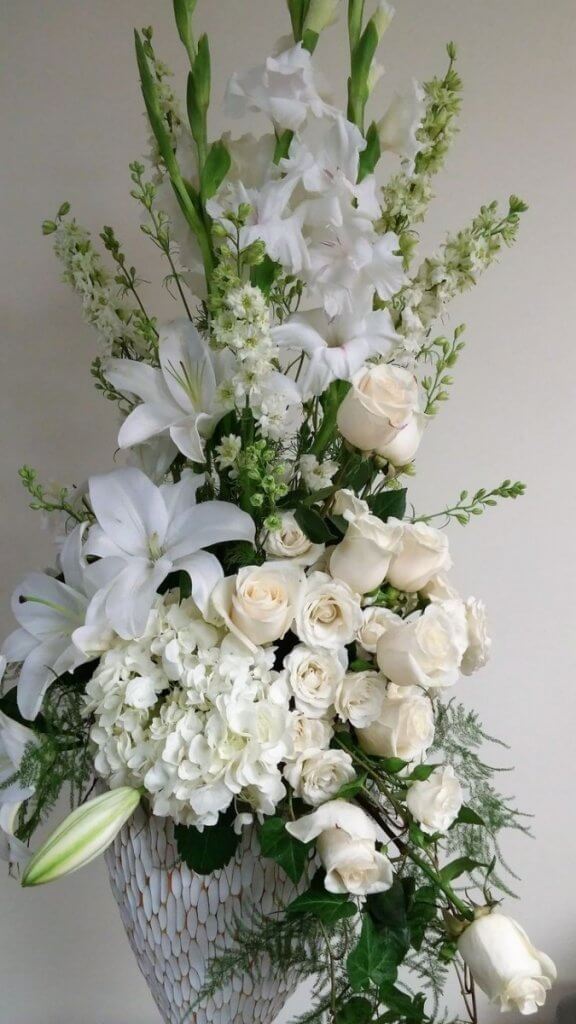
Gladioli, also known as “sword lilies,” is a tall and simple flower.
They come in a rainbow of bright colors, and are commonly paired with roses and lilies in funeral sprays and arrangements.
Due to their size and simplicity, it is rare to see them without other flowers accompanying them.
In terms of symbolism and meaning, gladioli convey faithfulness, loyalty, and integrity.
It is common to see gladioli at the funerals of those who worked “for the people.” They would be a great option if the deceased was a firefighter, police officer, or community leader.
6. Orchids
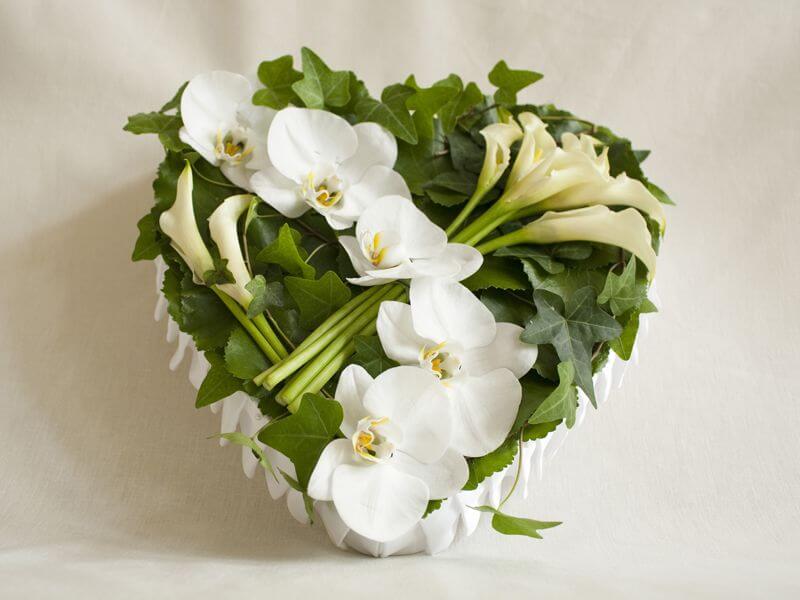
There are many different types of orchids available. The most popular sympathy variant is the phalaenopsis orchid in either a pink or white color.
Orchids are very versatile. They can be placed in wreaths, bouquets, sprays, and other arrangements.
Generally, orchids symbolize everlasting love for the deceased, and sympathy for their loved ones.
It is common to include orchids in funeral flower arrangements for a mother or father. However, different colors can have different implications:
- Red orchids represent passion, love, and care for the deceased.
- White orchids symbolize elegance and innocence.
- Pink orchids symbolize grace and elegance. These are most commonly used where the deceased was a mother, daughter, or grandmother.
- Yellow orchids represent friendship and platonic love. They are much less common at funerals and memorials.
7. Chrysanthemums
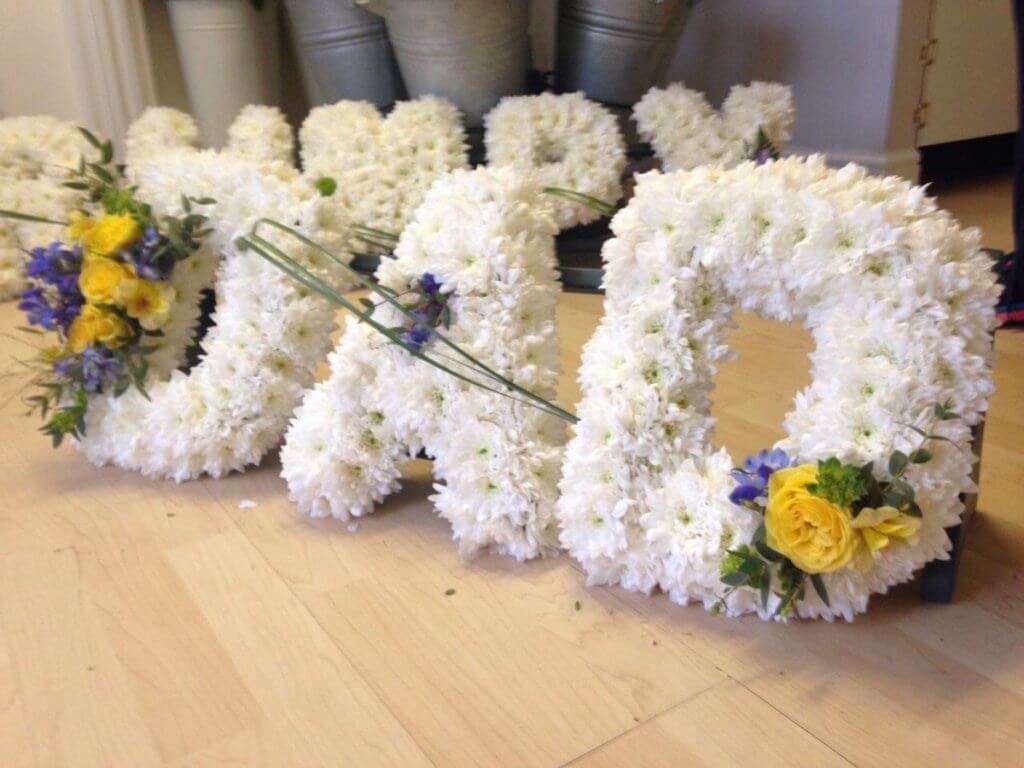
Chrysanthemums, often abbreviated as “mums,” used to be the most popular funeral flower by far.
They have fallen out of such popularity in recent years, but they are still a meaningful option.
Mums “stand out” less than most flowers, so they often form the “base” for arrangements containing other exotic and colorful options.
Mums are a familiar presence at all types of funerals, wakes, and memorials. They can be used in large arrangements and to spell words, like in the image above that spells out the word “dad.”
In some countries, especially in Asia, mums are the only flower that will appear at a funeral, symbolizing mourning, grief, life, and rebirth.
Most arrangements seen at funerals will only include white chrysanthemums. But you will often see red types used at funerals and events honoring veterans and soldiers.
8. Tulips
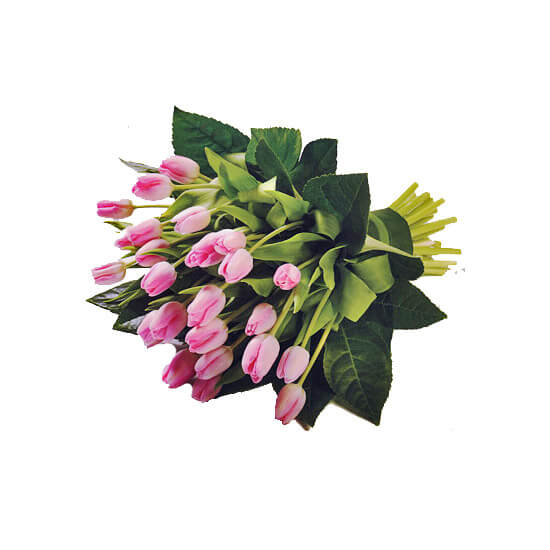
Finally, tulips are another flower that has died down in popularity over the years.
However, they are still an excellent choice to include in a sympathy bouquet.
They symbolize delicacy, love for the deceased, and deep sympathy for their family.
Types of Arrangements (With Examples)
Having covered the different types of flowers suitable for a funeral or as a condolences/sympathy gift; you should also consider will cover how these types of flowers can be arranged or presented appropriately.
| Funeral Flower Arrangement | Appearance | Usual Cost |
|---|---|---|
| Floral Baskets | Baskets filled with a display of sympathy flowers. | $50.00 – $250.00 |
| Standing Sprays | Vertical arrangement of flowers displayed on a tripod or easel. | 70.00 – $300.00+ |
| Wreaths | Circular shaped arrangements of flowers. | $50.00 – $300.00+ |
| Custom Shaped Arrangements | Arrangements like wreaths in a custom shape. | $100.00 – $400.00+ |
| Potted Plants | Any plant you can imagine. | $20.00 – $200.00+ |
| Casket Sprays | A large arrangement placed on the casket. | $200.00 – $400.00+ |
There are many options that all work great in different circumstances:
1. Floral Basket Arrangements
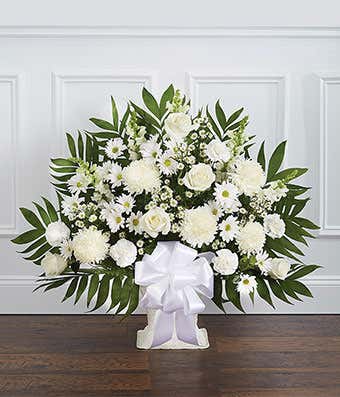
Floral basket arrangements are classic baskets filled with a beautiful display of flowers.
These baskets come in many sizes and are very versatile. They can be sent as a gift to the deceased’s closest loved ones, delivered to a funeral home for a wake, or sent to the church where the service will be held.
If you are planning the funeral yourself, you may consider an extravagant floral basket arrangement of white roses and complementary flowers suggested by your florist.
A great thing about floral baskets is that the basket can be reused long after the flowers have died. So the gift should retain meaning long into the future.
Your local florist may also have “floral box” options that are typically less expensive than funeral baskets. I have seen many of these that retained the beauty that makes floral baskets great.
Cost: $50.00 – $250.00
2. Standing Sprays
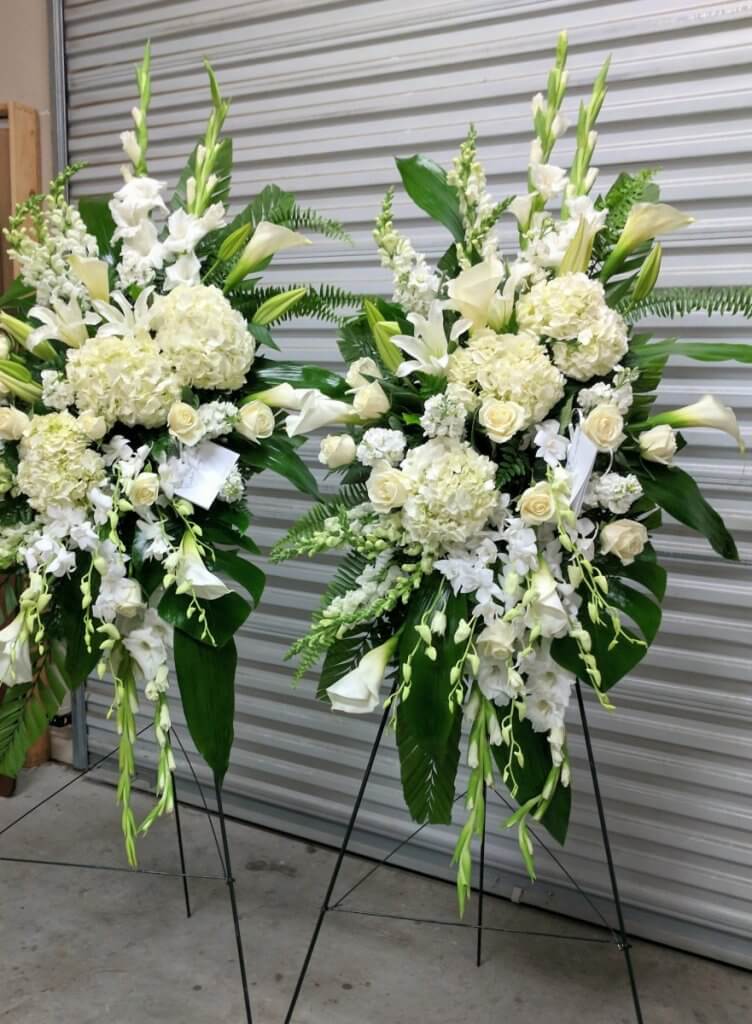
A funeral standing spray is a vertical arrangement of flowers displayed on a tripod or easel, usually near the casket or entrance to the service.
Standing sprays are usually organized by the deceased’s next-of-kin or the funeral director. It is generally not appropriate to give a standing spray as a gift to the deceased’s family.
If you are organizing the funeral, a standing spray can be a great centerpiece to honor your loved one.
There are many combinations of types, colors, and arrangements of flowers to choose from when picking out a standing spray.
However, it is hard to go wrong with an arrangement of assorted white flowers like in the example spray in the image above.
Cost: $70.00 – $300.00+
3. Wreaths
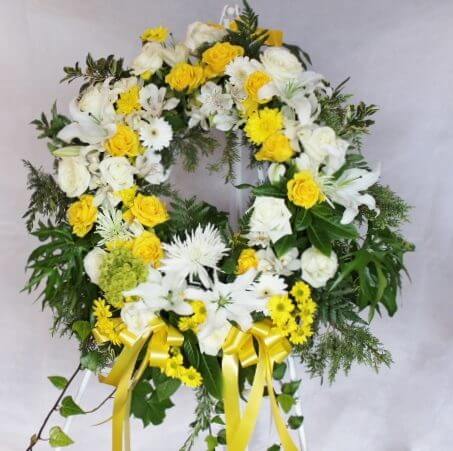
Funeral wreaths are circular shaped arrangements of flowers. They are perfect as sympathy flowers or if you are arranging the funeral yourself.
If you want to give a funeral wreath as a gift, you can send it to the funeral home. The funeral director will decide where they will be placed during the service. Sometimes, they will pass them directly on to the deceased’s next of kin.
Wreaths are symbolic of love and condolences for the deceased and their family.
Like the other arrangements, memorial wreaths come in various types. They can be propped up on a tripod/easel, or in some cases, they will be placed on the lower half of the casket. They can also appear at the gravesite.
Cost: $50.00 – $300.00+
4. Custom Shaped Arrangements
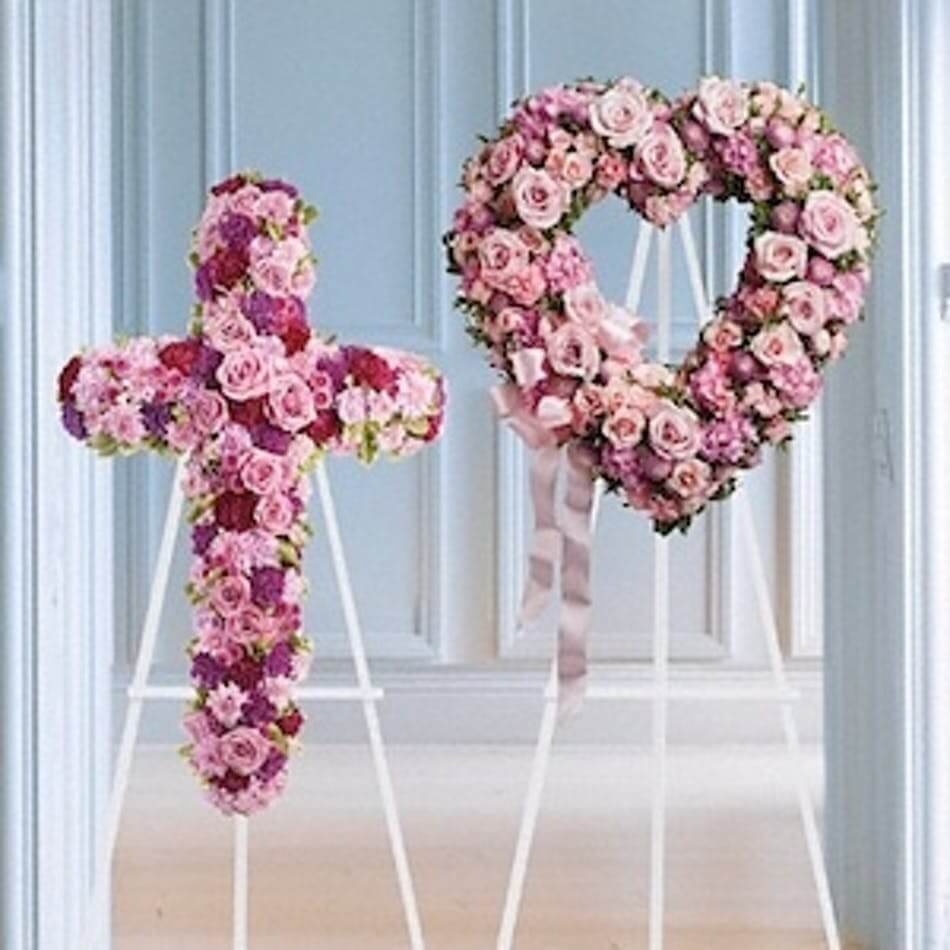
A substitute for a classic circle wreath may be a similar arrangement organized in a custom shape, such as in the shape of a heart or a cross.
These arrangements serve the same purpose as a traditional wreath, but are more suited for funerals that are less “formal”.
Cost: $100.00 – $400.00+
5. Plants
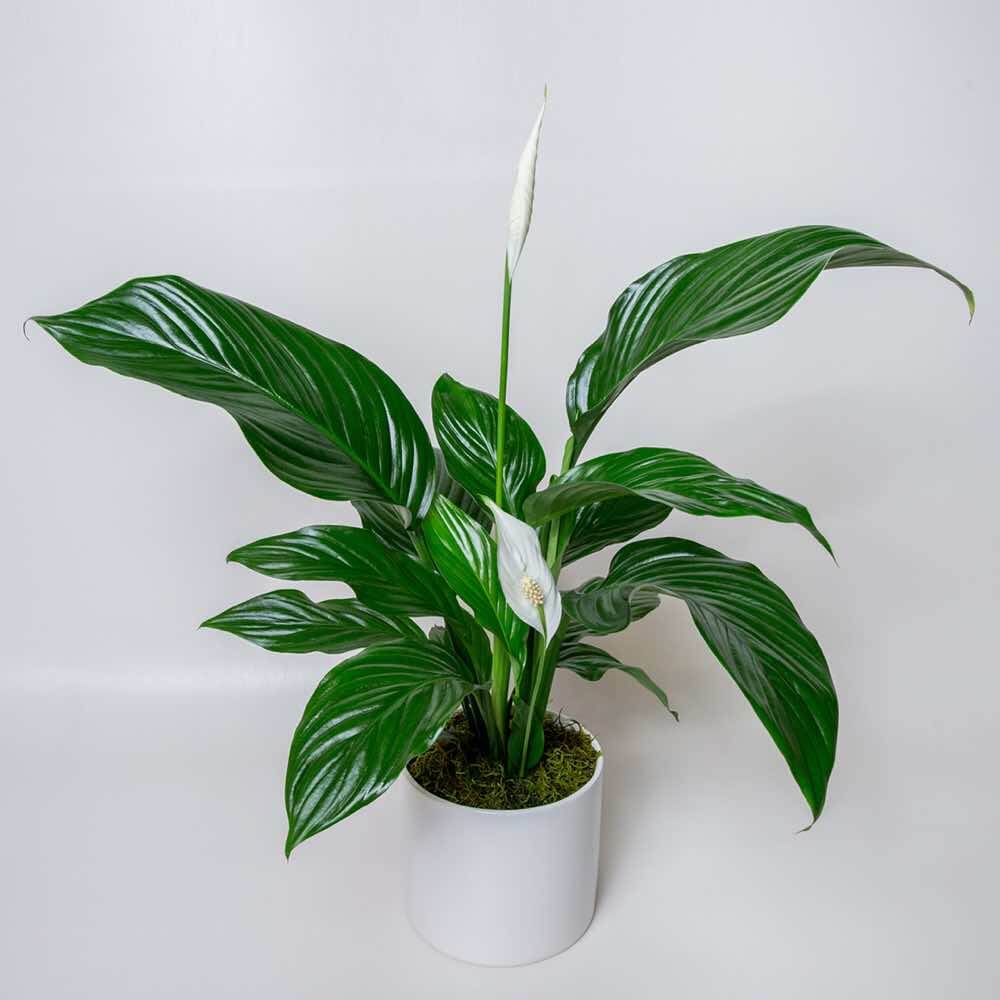
A less traditional approach is sending a potted plant to the deceased’s family as a symbol of your condolences. A local florist could assist you with this.
While it would be unusual for this type of arrangement to appear at the funeral, it is still a touching and meaningful gift.
A peace lily is an excellent idea for a potted plant that holds a lot of symbolism and is relatively easy to care for.
As previously discussed above, peace lilies symbolize deep sympathy and condolences – they are also beautiful.
Cost: $20.00 – $200.00+
6. Casket Sprays
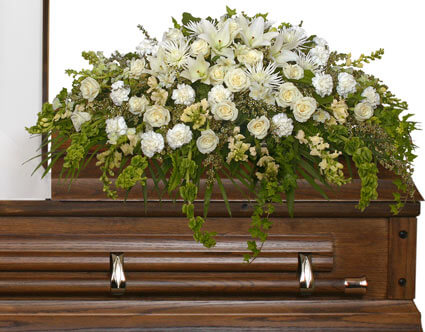
A casket spray is a large flower arrangement placed on top of the casket at a funeral. Usually they cover the full casket, but sometimes they might only cover half.
Unlike some of the other arrangements on this list, casket sprays are usually chosen by the deceased’s family. If you are invited as a guest and are just wanting to bring a gift, a smaller arrangement will be a better choice for you.
Cost: $200.00+
Where To Send Funeral Flowers?
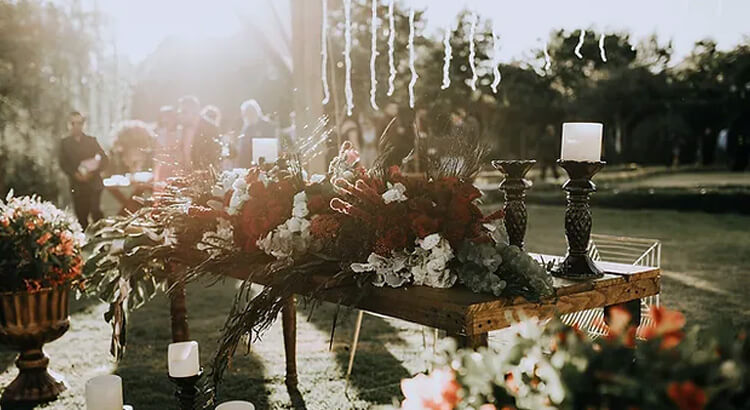
If you’re wondering where to send the flowers, there are a number of options:
- Funeral Home: The most common place to send funeral flowers is directly to the funeral home or memorial service location. You can contact the funeral home for their preferred florist or select your own online.
- Church: If there will be a religious service held at a church, you may choose to have flowers sent there instead of or in addition to the funeral home.
- Family’s Home: If you are closed to the deceased’s family, you could also opt to have flowers delivered directly to their home.
It is always best practice check with the family before sending any condolence gift including floral arrangements as it helps them manage everything better while grieving.
When Not to Send Memorial Flowers?
While sending flowers can be a thoughtful way to express sympathy and support, there are some situations where it may not be appropriate. Here are some instances when you might want to avoid sending memorial flowers:
- Cultural/Religious Considerations: It’s important to respect the cultural or religious beliefs of the deceased and their family when deciding whether or not to send flowers. In some cultures, certain types of flowers or colors may have negative connotations. Again – check with the family!
- Personal Relationship: If you didn’t know the person who passed away very well, it may not be necessary for you to send memorial flowers.
- Timing: Depending on how soon after the loss occurs that you become aware of it, it is best practice wait till after funeral arrangements have been finalized before considering sending any condolence gift including floral arrangement.

